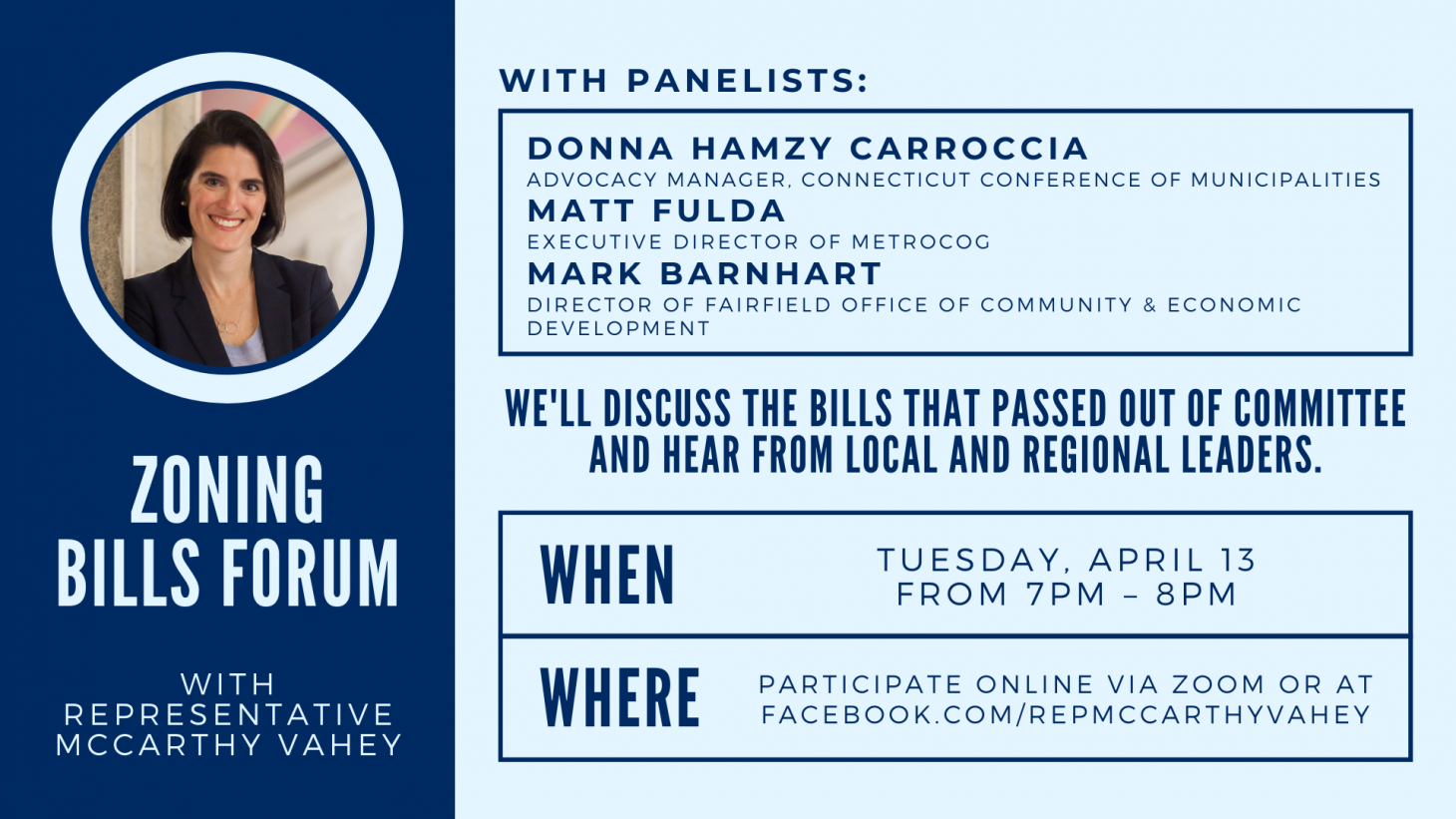| Learn More About the Bills
H.B. No. 6107 (RAISED) AN ACT CONCERNING THE REORGANIZATION OF THE ZONING ENABLING ACT AND THE PROMOTION OF MUNICIPAL COMPLIANCE
- The bill re-organizes, simplifies and clarifies the 8-2 zoning statute, otherwise known as the zoning enabling statute. This is the law that gives municipalities the right to create local zoning regulations. It removes the use of the word character as a specific consideration for zoning, and underscores that zoning must affirmatively further the purposes of the federal Fair Housing Act. Clarifies that affordable housing plans developed by municipalities are required to be submitted to the state Office of Policy and Management by June 1, 2022. Fairfield's current affordable housing plan is in the process of being updated, led by Mark Barnhart of our Economic Development office and our volunteer Affordable Housing Committee.
- The bill also creates a working group that will recommend guidelines and incentives for compliance with 8-30j, how compliance would be determined, and what evidence of compliance would be required. An almost identical version of this bill passed the House in 2019 with broad bipartisan support and passed out of committee last year with only one no vote.
S.B. No. 1026 (RAISED) AN ACT CONCERNING TRAINING FOR CERTAIN PLANNING AND ZONING OFFICIALS
- This bill requires individuals who serve on land use commissions participate in 5 hours of training upon election or appointment. Training may be done electronically and provided by a variety of organizations, including the Land Use Academy at the Center for Land Use Education and Research at the University of Connecticut and the American Bar Association. Planning and zoning commissions are required to report training compliance to the legislative bodies of the municipality.
- This bill has been championed by the Partnership for Strong Communities. You can learn more about that organization, who participates in the coalition, and the research they have done on training requirements in other states here.
H.B. No. 6613 (RAISED) AN ACT CONCERNING ACCESSORY APARTMENTS, MIDDLE HOUSING AND MULTIFAMILY HOUSING
- This bill was not voted on by the committee and will not move forward.
H.B. No. 6611 (RAISED) AN ACT CONCERNING A NEEDS ASSESSMENT AND OTHER POLICIES REGARDING AFFORDABLE HOUSING AND DEVELOPMENT
- Referred to by some as the "Fair Share" bill, based on a program that is in place in New Jersey, this legislation requires the state to work to provide towns with goals for the development of housing units. Towns would locally develop their own plans for how to meet these goals.
- As described on the Connecticut General Assembly website, this bill would "provide for (1) an assessment of the state-wide need for affordable housing and an allocation of such need to planning regions and municipalities, (2) the creation of affordable housing planning and zoning goals for each municipality, (3) the implementation schedule for such goals, (4) enforcement of such goals, and (5) state support to meet affordable housing needs beyond those met through such goals."
- The substitute language change from the original bill combines MetroCOG and WestCOG planning regions for the purposes of accounting for a regional fair share.
- You can learn more about the background on this proposal and Fair Share at the Open Communities Alliance website.
S.B. No. 1024 (RAISED) AN ACT CONCERNING ZONING AUTHORITY, CERTAIN DESIGN GUIDELINES, QUALIFICATIONS OF CERTAIN LAND USE OFFICIALS AND CERTAIN SEWAGE DISPOSAL SYSTEMS
- Advocated for by "Desegregate CT", this legislation also re-organizes and makes additional modifications to the 8-2 statute beyond HB 6107. The bill replaces "character of the district" with "physical site characteristics and architectural context." It provides homeowners the right to add "accessory dwelling units " (ADUs) to their properties. It limits the ability of towns to mandate parking minimums above certain levels and uses bedrooms in a dwelling unit to guide the decision making. It requires zoning enforcement officers to be trained and allows for subsurface community sewage systems to handle greater capacity, in part to address potential ADUs. It creates a working group to develop model codes which local bodies can choose to adopt for the review building proposals.
- It creates a working group to develop model codes which local bodies can choose to adopt for the review of building proposals.
- What was NOT voted out of committee and was removed from the original proposal was a requirement that municipalities permit transit orientated development (TOD) construction and "main street" construction of multi-family units This was section 6 of the original bill. Also removed were lines 357-364 of the original bill that would allow aggrieved parties to take legal action on noncompliant municipal zoning regulations. The training requirements for land use commissioners, section 9 of the original bill, were also removed.
- To learn more about who Desegregate CT is click here.
|

